#reentrythatworks
Text
Give a Beat Wraps Up All Hands on the Decks Fundraising and Advocacy Campaign!
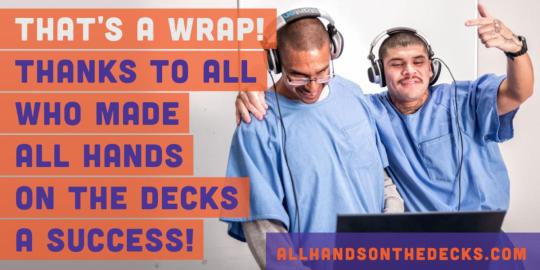
By Julia Bistriceanu
We are beyond grateful to everyone who donated and participated in Give a Beat’s All Hands on the Decks fundraising and advocacy campaign. Thanks to your contributions, we raised $21,641 (87% of our goal)!
The goal of this initiative was to not only raise money for our upcoming On a New Track Reentry Mentor Program, but also to mobilize our community to support critical criminal justice reform measures in the November 3rd election. This campaign aimed to support returning citizens on a micro level by raising money for the reentry program and on the macro level by pushing for key criminal justice reform measures that impact those affected by incarceration. In a time when the country faces enormous challenges, Give a Beat felt it was important to engage and educate the community around the importance of voting, local and state measures, and elected officials. The campaign was bigger than just us and our programs.
We are very excited to see sweeping successes in criminal justice reform measures across the country such as the passing of Prop 17 in California, which restores the right to vote to over 50,000 people on parole. Because of tremendous and impressive efforts by activists, organizers, and members of our community, criminal justice reform is now one of the issues at the forefront of the political conversation. We will continue to advocate for these meaningful changes in the system!
Big thank you to the incredible artists and supporters who donated their time and talent to host benefit livestreams for the campaign. We appreciate your amazing contributions: Nickodemus, Nappy G, OVEOUS, Eddy Plenty, DJ Bellatini, Official Tony H, J Disko, the Housepitality team, and Turntables on the Hudson!
Thanks to a Reentry Through The Arts grant from the California Arts Council and the donations from this campaign we will be kicking off our unique “On a New Track” Reentry Mentoring Program this January.
We will be teaching returning citizens the art of DJing, Music Production, and related business and entrepreneurial skills. Funds from All Hands on the Decks are covering for the costs for each participant to have the gear they need to be successful with the program, to attend the course, receive one-to-one mentoring support, for our teaching artists to teach the course, and for Give a Beat to extend the program to support participants in their ongoing career goals.
By connecting formerly incarcerated individuals with music business professionals, we aim to develop a cycle of change that encourages people to harness their creative talents while activating our music industry and community members to be active advocates for justice! Mentoring has the potential to completely transform returning citizens' lives, as they are often released into a world they no longer recognize and may not know how to navigate. Mentors offer guidance, support and encouragement that is crucial to establishing enjoyable, fulfilling lives on the outside for returning citizens.
Please stay tuned for the launch of our program in 2021!
#Reentry#reentrythatworks#mentoring#second chances#prison#prison reform#cjreform#criminal justice#djing#music education
2 notes
·
View notes
Text
Give a Beat Launches “All Hands on the Decks” Fundraising + Advocacy Campaign for New Reentry Program And to Encourage Critical Voting in Upcoming Election [PRESS RELEASE]
September 10 - October 10
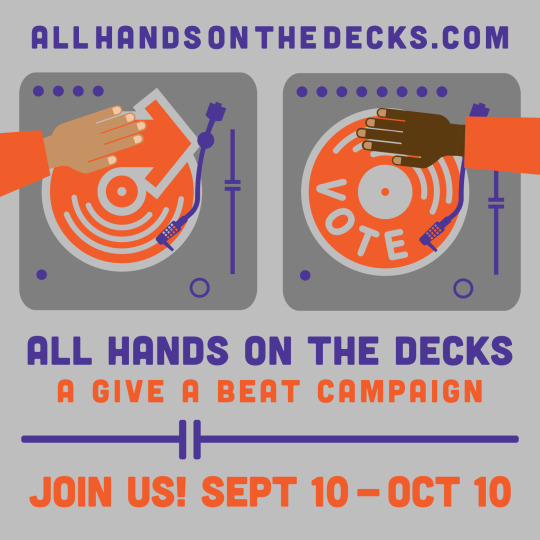
LOS ANGELES – September 10 – Give a Beat launches “All Hands on the Decks” fundraising and advocacy campaign on September 10th to raise funds for their pilot “On a New Track” post-incarceration reentry mentoring program and to encourage critical voting in the upcoming election. The campaign aims to raise awareness about the plethora of unjust barriers people face upon reentry and mobilize communities to support criminal justice reform legislation. Funds raised will allow Give a Beat (GAB) to expand their reentry mentoring program to reach more people and ensure that participants have the resources and support they need to pursue their creative career dreams. The campaign will run September 10 - October 10. More info is at allhandsonthedecks.com.
Give a Beat was awarded a Reentry Through The Arts grant from the California Arts Council to pilot its unique “On a New Track” reentry mentoring program in collaboration with Defy Ventures and California Mentoring Partnership. GAB will train eight formerly incarcerated participants from the Defy Ventures community in the art of DJing, music production, and related business and entrepreneurial skills. By connecting previously incarcerated individuals with music business professionals, Give a Beat aims to develop a cycle of change that encourages people to harness their creative talents while engaging members of the electronic music community to educate themselves about bills and legislation. .
“Defy is excited to partner with Give a Beat to bring opportunities in the music industry to formerly incarcerated individuals in our program. There's no better city than Los Angeles in which to train people in a musical field, and people with criminal histories have incredible talent to share with the world if given the chance to do so. This partnership will lift the voices of people with criminal histories and create opportunities for them in the creative field in our city.” - Mariah Dickinson - Director of Development and Marketing, Defy Ventures
In addition to raising funds to support previously incarcerated people on the individual level, Give a Beat’s “All Hands on the Decks” campaign also serves to advocate for people experiencing incarceration on the macro scale. By aligning with allies in the broader social justice movement, this campaign will bring attention to the various obstacles people face upon leaving prison. It will also educate the music community on ballot initiatives such as Prop 17 which restores the right to vote for people on parole and Prop 20 that aims to undo progressive reforms.
“All Hands on the Decks” will also educate around the power that electable positions hold in relation to criminal justice at the city, county, and state levels. These positions are key to strengthening the defense of our civil rights and emboldening our ability to make progressive change. This campaign’s name illustrates that now is a critical time both for the organization and for the future of the country to have “All Hands on the Decks” to engage communities to get more involved and take meaningful action.
About Give a Beat: Give a Beat’s mission is to reduce the harmful effects of incarceration through music production, DJing and other education programs that transform individuals and inspire communities to take action. Through music education and mentoring programs in juvenile halls, schools, and our Prison Electronic Music Program, we engage the music industry to help widen the pathways for people to thrive, tackle systemic racism, and contribute to the larger criminal justice movement. To learn more, please visit https://www.giveabeat.org.
About Defy Ventures: Defy Ventures is a national nonprofit whose mission is to shift mindsets to give people with criminal histories their best shot at a second chance through entrepreneurship, career readiness, and personal development training programs delivered both in prison and in the community. Defy’s vision is to cut recidivism (return-to-prison) rates in half by leveraging entrepreneurship to increase economic opportunity and transform lives. In 2020, Defy is helping currently and formerly incarcerated people defy the odds in seven states and 16 prisons across the country. Together with the thousands of business executives and leaders in our network, we are helping to shift the conversation and landscape of opportunity for people with criminal histories. To learn more, please visit https://www.defyventures.org.
California Mentoring Partnership: The California Mentoring Partnership (CMP) acts as an advocate for the advancement of effective mentoring by encouraging, developing, strengthening, and sustaining quality mentoring programs throughout the state. CMP unifies and raises the visibility of the statewide mentoring community via support of regional and interest-based coalitions, online platforms to connect the field to resources, public awareness drives and legislative advocacy, and state gatherings that educate and inspire. To learn more, please visit https://www.camentoringpartnership.org.
2 notes
·
View notes
Text
American Youth and the Criminal Justice System
Sean Wilson, Give a Beat Advisory Board Member and Member of the Anti-Recidivism Coalition Shares His Experiences with the Criminal Justice System and How a New Mentorship Program with Give a Beat Can Change the Lives of Many Young Americans
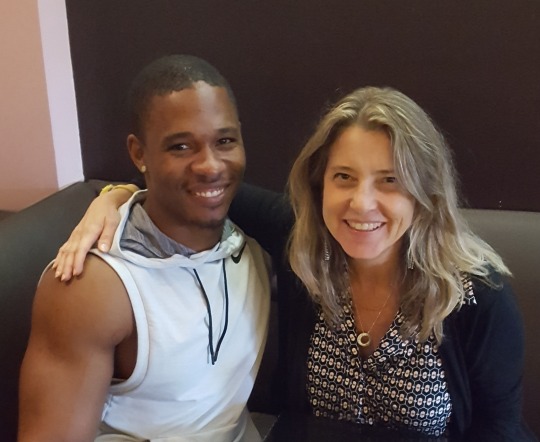
Sean Wilson, Give a Beat Advisory Board Member and Lauren Segal, Founder/ED Give a Beat
By Celine West, Give a Beat Social Media Team Member
Sean Wilson of the Anti-Recidivism Coalition openly shared with Give a Beat about his early life experiences and the time he spent in the criminal justice system. He shared how his journey eventually led him to become a member of the Anti-Recidivism Coalition and to later partner with Give a Beat Founder, Lauren Segal. Together, Lauren and Sean are creating a mentorship program that bridges a critical gap for the younger generation who face incarceration, teaching them how to develop productive and fulfilling careers. While the inspiration for this project was made clear through Sean's own personal story, he explained how the mentorship project with Give a Beat can change the experience of many young Americans in the Criminal Justice System.
GAB: Could you tell me about your earlier experiences growing up with your mother and grandmother?
SW: I would describe my household as a family of love. That’s the first thing that comes to my mind when I think about the family that I come from. My mother and grandmother were loving and affectionate. I had everything I wanted and needed growing up so there was nothing that was missing from my household. I would consider my background pretty normal as far as my childhood goes.

Sean Wilson during his football years
GAB: Please tell me about your early academic inclinations and the influence of your parents in becoming a music enthusiast?
SW: By the time I went to elementary, my mother was enrolled in college. Since then, she always instilled educational values in me and told me that education was going to be the key to my success. I love learning, I love reading, I was always a big science geek and my grandmother worked at UCLA. I was accepted to multiple magnet schools growing up. Until the age of, I would say, 11 or 12, I was pretty much an A, B student. I was a pretty smart kid. It was just my behavior that was my problem. That’s what my teachers would always say.
And as far as music goes, my father was a DJ and a scratcher. So, growing up, I can remember from the age of 2 or 3, music was always around me. He was always DJing at a house party or something like that. My mother was always in the living room singing. My grandfather was a leader of his own band. So, music has been around me since the beginning of time.
GAB: What would you say were the experiences that influenced you, in your early adolescence, to engage in a lifestyle that was contrary to your character and upbringing?
SW: In hindsight, just looking at my entire life from the time I was getting in trouble, obviously, with most kids, you would identify them as seeking attention. And that may have been the case, but I would like to look at it on a deeper level. And I was just trying to figure out how it was to be a man or what my manhood should look like even at such an early age because as I said earlier, growing up, I had all the love and nurturing and support from my mother and my grandmother. But there were characteristics and elements of being a man, a boy to a man, that were missing. So, I was searching for these things within my environment, not even knowing, through gangbanging or selling drugs or just participating in criminal activity in general. And I can see all of that as a way to figure out what it is to become a man, but just in a negative way.
GAB: What would you say could have been a factor in preventing you from engaging in this lifestyle in terms of positive support and productive outlets?
SW: Just having a positive role model. Growing up playing football, I noticed that a lot of my teammates had their fathers there or some male role model in their life who they aspired to be like, and that was their positive role model - even if it was their own peers. I think, first and foremost, just having a positive male role model or even a mentor, or something like that, or just a guide for the things that I was dealing with —the talents and skills that I had cultivated— to something more positive as opposed to allowing them to be misled by other negative outlets like gangbanging and selling drugs. Whatever it is that you participate in in your environment – I just look at it is as an outlet, or trying to find out what is an appropriate outlet for them, but it takes the maturity and guidance of an adult to actually lead them. Unfortunately, they don’t have that and you should have that in your household. But not everyone is fortunate to grow up with both a mother and a father, so I think it would have been something that would have kind of deterred me from going down that route.
GAB: Could you tell me about the juvenile facilities and continuation programs that you were in prior to the incident that led to your 10 year prison sentence?
SW: I look at that whole process, and I mean, the continuation program and the juvenile facility. But just beginning in the school system, it’s like when you have a kid who has a behavior problem, the first thing you do is you exile him and kick him out of school and send him to a continuation school, calling him a behavior problem, not really sitting down and taking the time to figure out what is the issue at hand. What that does is it leaves you with a kid with a lot of time to do what with it? And not know what to do with it. That’s generally how you get into trouble - just having too much time on your hands and not being productive. In other words, I’ve just seen that process of getting kicked out of school, going to jail, learning how to become a better criminal while in jail, getting out, practicing the things that I learned in jail and making a mistake and coming back again - and then this process getting deeper and deeper. And slowly I’m getting extracted from mainstream society or what kids my particular age should be doing I’m not doing because everything has been taken away from me. I’ve been kicked out of this school, kicked off this football program, just different things. So, you’re just left to do what? And not knowing what to do with it.
It’s a process that is designed to make you worse and not better. Just between the facilities and the continuation program and how they deal with the issues or what they’re doing with you, you’re not being rehabilitated when you’re in a juvenile facility. In fact you’re learning how to become a better criminal.

Teenage Sean Wilson at home
GAB: Please tell me about the time when you were in prison when you had come to accept that the lifestyle you had previously been involved with did not line up with your character and upbringing?
SW: While incarcerated, you have to survive. You have to keep moving forward. You have to keep living even though you’re in this place where you don’t feel like living or it doesn’t feel like you are living. So, again, being in institutions like that, especially for someone like me, I started off in a maximum security prison where the majority of the population were lifers. So, you were exposed to a deeper realm of criminality because they had nothing to lose, whereas someone like me, I had a release date. But you get exposed to the pressures of selling drugs or just being manipulative. I like to look at it as just that and engaging in that because I had seen that as an opportunity of helping me get through my time because the first question that I had to ask myself was, “How was I going to get myself through this entire 10 years? What was I going to do?” And so anything I could do was everything.
But at a point, I had to just stop, and I remember a particular time where I had begun to start selling drugs and I just had this epiphany where I was like, my mother never taught me to sell drugs. I never sold drugs on the streets. Why would this be something that I would do in here? Why would I risk doing longer time when I can’t even endure the time that I’m doing now? And I realized that none of this stuff was working for me. I look back at my life at this particular time. I was 21. I’ve been in this lifestyle since I was 12 and it hasn’t been working for me. Why would I keep going? Why would I risk being like the very people that are around me and trying to push this on me and that’s when I realized this just wasn’t for me because it’s not working. If I was a good criminal, I wouldn’t be where I was and I wouldn’t continue to be going through the things I was going through. And that’s when I came to that acceptance that I had to give myself a chance to do something good, give myself a chance at real life, to try to be successful, like a real person, a normal person and a normal citizen like your mother wants you to be or any parent, or whatever, would want their kids to be. That’s how I came to that acceptance.
GAB: Please tell me about the time when your love for music solidified and when you decided to explore music production?
SW: Music was the thing that I turned to, to help me get through my time. That was like the most important thing to me while I was incarcerated. I just had to have my music. I had to have it. So, I would just spend nights, like late nights, 2 or 3 in the morning, just listening to music and absorbing a beat, and taking it all in, and breaking down the creative process and construction of sound.
I just remember in one moment just listening to a beat. I was just infatuated with how you can just take all of these different sounds and where they come from and how they sound and find the right tempo, the right beat, the right rhythm, and everything - the whole harmony, the melody, and how you can just put this all together and just make one beautiful sound. And then it just imposes this feeling upon a person that is just so great, and I wanted to be good at something. I’ve always wanted to be good at something and excel at something. If there was anything that I wanted to do with my life, it would be that. I would want to give people the same feeling that music gives me. And that’s what did it for me.
GAB: How did your enrollment in community college, during your incarceration, help you to realize your true values and your personal aspirations?
SW: For the first 3 years, I avoided going to college because I was afraid I would fail. I looked at it like I was already in the worst place that you could ever be in life, or so I felt, and just to fail at something else, I couldn’t bear to feel that at that moment.
But after a while, and after having accepted the lifestyle I was living prior to wasn’t for me, my only choice was to move forward and do something positive or productive and college or education was the one thing that I knew that I could turn to, or felt most comfortable with, because it’s what I knew. So, I felt like, “I’ll settle for being a C student,” and then I started getting A’s. Then I’m like, “Okay, I’ll settle for a B on a test,” and then I started getting A’s. It was just this continuous process of not believing in myself or not believing I could do better and then proving my own self wrong. And then I had to come to terms and I had to reconcile with what I really believed about myself and start to try to change and start to believe differently about what I could accomplish and my capabilities and so on and so forth. I went from just wanting to settle and being a C student, just to say that I was a college graduate, to a graduate and valedictorian of my class.
To do something that you didn’t intend to do or expect to do, but it’s something that’s in you and that you have the power and capability to do, makes you question everything. What else can I do? If I did this and I didn’t intend to, what else can I do and how far can I take this?
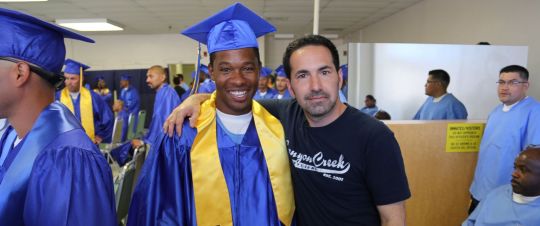
Sean Wilson, Valedictorian, at his graduation ceremony with Scott Budnick, Founder of the Anti-Recidivism Coalition
GAB: I understand you gave a TED Talk in 2014, entitled, “Fear.” Congratulations, by the way, because that is quite an accomplishment. Can you say one thing about fear and how fear has played a role in previously holding you back in life?
SW: One of the biggest moments when fear played a role in my life was when I started playing football. I started playing football at a later age than when most kids typically start, which is usually around 6 or 7. I started around 12 or 11-years-old and I felt inferior to my peers and teammates because they had fathers. Their fathers put them in football when they were young. They probably were more proficient at playing their sport then I was or more athletic than me. I felt like I couldn’t match them in their capabilities although I was actually wrong in that. Had I not told myself these things, my self-confidence would have been a little bit more positive, or had I had someone by my side to actually point out my capability compared to theirs I probably would have excelled a little bit more in football than I did. And I think that’s the reason why I had stopped playing in the first place or why I was kicked out of school and I wasn’t able to play football anymore. I think that was the big down turn of everything - just losing in something that I actually gravitated towards and was actually good at. But I just didn’t have the confidence to match my potential.
youtube
GAB: Did giving the TED Talk give you a new impression of your abilities since that is such a big thing to do?
SW: Yes, again because I’m terrified of public speaking. I’m super terrified of public speaking, but again I had to look back at my life and I had to realize that the whole process of my life from the age that I started getting in trouble was a process of fear and shying away from it. And where fear had led me, it had led me in a box, literally and metaphorically speaking. It just kept taking every opportunity away from me just because I was afraid I couldn’t do this or do that and I realized that I couldn’t continue to live my life like that anymore, otherwise I would wind up in a position. Maybe not the same position, but just in a box or prison in your mind, mentally feeling like you just can’t do anything.
So, that’s what gave me the confidence to go against something that I had been shying away from my whole life. That opportunity came after my realization that I had from going to college and I felt like this was the time to do something different. This was the time to be confident. This was the time to tell my story and everything. That’s the whole reason why I named my TED Talk “Fear.” I didn’t know what it was even going to be about or what I would talk about and that’s just how the whole talk came about in the first place – looking back and realizing the process of my life.
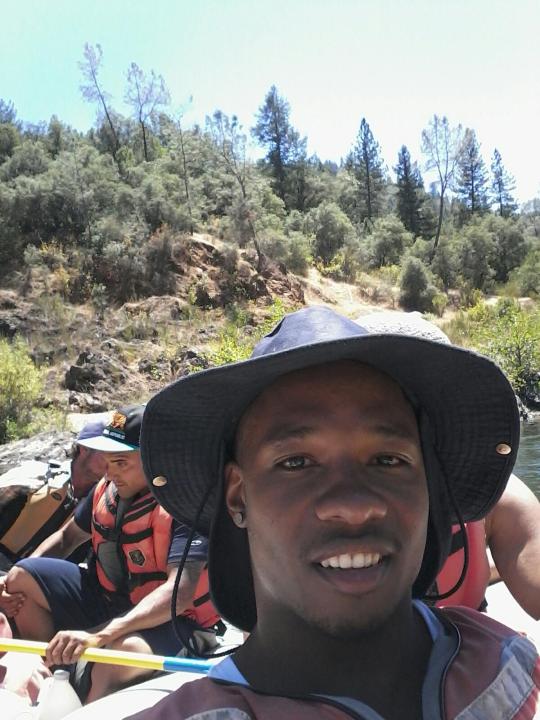
Sean Wilson during ARC camping trip
GAB: Could you tell me about how you became involved with the Anti-Recidivism Coalition and how that led to your introduction to the founder of Give a Beat, Lauren Segal?
SW: I met the founder of the Anti-Recidivism Coalition, Scott Budnick, through my co-defendant Bruno Williams. Scott Budnick used to facilitate a program called “Inside Out Writers,” this creative writing program in the juvenile hall and now they’re in state prison. So, I expressed my desire to go to college and that’s when my co-defendant connected me with Scott Budnick who was able to help me get to an institution where I could enroll in college. As I succeeded in college I became someone on his radar, someone whose potential he wanted to help cultivate. And that’s when he gave me the opportunity to do the Ted Talk.
My membership with Anti-Recidivism Coalition became informal and now it’s formal – I’m an actual member. When I came home, I expressed my interest in music production and that’s when the program director, Cheryl Bonacci, introduced me to Lauren. This was about a month post my release and Lauren and I had an extensive conversation. We shared our stories. We shared our passions and everything. We just connected from there. Ever since then, Lauren had been very supportive and proactive in my life and has always kept in touch with me. She always made sure if I needed something she was there - she would do her best to try to help me get it. That’s the role that she’s been playing in my life since I met her.

Sean Wilson with fellow ARC members and artist T.I.
GAB: Could you tell me a little about your hopes and vision about the mentorship program that you are helping to create with Give a Beat?
SW: My vision for the mentor program is just simple. We want to help people coming out of prison choose music and a career path as an outlet instead of the things that I chose as an outlet --or people who come from similar circumstances-- like we all do. What we usually choose as an outlet, we want to change in hopes that that outlet will eventually evolve into a music career or other career with the right guide. It’s the right support, the right skill, the right talent with the right people around them, with the right love and everything like that. Instead of them wasting their lives and their potential in the institutions with so much talent.
I’ve experienced from the time I was 12, 13, 14, and I started going into these institutions, I’ve seen so many talented individuals, specifically, like artists and musicians and they just don’t know. They have the skill and the talent but they just don’t know what to do with it because they don’t have the right people around them. My hope is that we will create a mentorship program with the right people around these people who need help and who need this guidance and who need to have their artistic abilities cultivated as opposed to going down a road that will never lead them anywhere.
Listening to Sean describe his experiences with exceptional clarity and insight imparts an invaluable understanding of the early life experience of many young American men. It also reminds us of the inherent vulnerability and the profound courage that each of us share in our humanness and the capacity of music to drum out the love and tenderness that reside in the soul, re-establishing commonality, bridging community, and when necessary, allowing us to begin again.
#juvenile justice#reentrythatworks#tedtalks#tedx#giveabeat#Anti-Recidivism Coalition#recidivism#EndMassIncarceration#mentorship#incarceration#musicforgood#music#dance music#empowerment
0 notes
Text
Give a Beat Explores the Four California Ballot Initiatives on Criminal Justice
Give a Beat Looks Into How Each Criminal Justice Ballot Initiative Addresses Social Injustice within the Criminal Justice System and How Voters May Help Create a Better Outcome for all on November 8th

By Celine West, Give A Beat Social Media Team Member
With a little more than a week to go before we exercise our right to vote and help create change in areas within in our reach, Give a Beat has been looking into the current issues that most deeply resonate with our core values.
We have learned so much about human nature through our social justice work and have come to understand that circumstance often plays a role in determining the outcome for a person. There are four ballot initiatives in California that deal with criminal justice issues and Give a Beat explores each one.
Yes on Prop 57
Formerly incarcerated individuals have expressed to us in the past that if they had previously been given an outlet they would have been able to succeed in their lives and would not have gone to prison in the first place. Proposition 57 encourages the development of critical social and life skills that non-violent offenders can utilize for a more successful transition if reintegrated back into society. This initiative supports the implementation of a rehabilitation program for non-violent offenders who wish to earn their way out of prison through following rules, working, and receiving an education.
While proposition 57 does not automatically grant parole, it ensures they pass a strict review of the parole board. Under the current system, inmates are released on a fixed date regardless of behavior and with the absence of incentives for rehabilitation. This current model of a fixed system has sharply increased California’s prison population while doubling the recidivism rate.

Yes on Prop 64
Electronic dance music culture is known for creating a safe haven for people of all different backgrounds and styles to come together and enjoy each other’s company and common humanity. This shared passion lends itself to an inherent set of standards and subsequently a space for unity. Proposition 64 was created as a starting point in replacing the often chaotic, lawless cultivation and distribution of marijuana while addressing an ongoing imbalance in the justice system. This initiative proposes tough regulations on the distribution of marijuana and aims to reduce crowding our over-burdened courts through the prosecution of marijuana violations.
In addition to the implementation of safeguards such as strict distribution through licensed marijuana businesses and the banning of any marketing and advertising directed toward children, the majority of the tax revenue generated by Proposition 64 will fund drug education, prevention and treatment programs for teens as well as afterschool programs. Overall, the initiative is designed to build standards for an already common practice where there previously were none, decriminalize standardized uses of marijuana, and increase drug education and treatment programs for teens.
Yes on Prop 62
It has become increasingly difficult to look away from many of the injustices and, often times, the nonsense embedded in the justice system. While many inmates on death row are there for crimes they committed, there are an extensive number of prisoners –150 around the country and 66 in California—who have been proven innocent due to DNA technology and new evidence.
With a lengthy appeals process, the death penalty is, overall, more expensive to operate than life in prison without parole. Inmates who are on death row are more likely to die of natural causes than by the implementation of capital punishment. With hearings and appeals that last for 20 to 30 years, the death penalty still places an enormous expense on taxpayers with a cost of $384 million per execution.
Proposition 62 repeals the death penalty in California, saving taxpayers on expenses that go into a system that fluctuates between a state of slow-functioning to malfunctioning and replaces it with life imprisonment without parole.
No on Prop 66
Proposition 66 was created in an attempt to streamline the death penalty instead of repealing it. This proposition would require appeals in state courts to be completed within five years and the state corrections system to develop a legal method of execution within 90 days of the planned method being found illegal.
If fully implemented, this would theoretically be a feasible plan, although the initiative would require extensive funding while wading through a backlog of appeals for many years to come. It will also run the unavoidable risk of taking the lives of innocent people wrongfully convicted of crimes they never committed.
Former death row inmate, Juan Melendez, who was wrongfully convicted of murder in New York, and was later exonerated, said, “You can always release someone from jail, but you can’t release someone from the grave.” The Proposition 66 initiative aims to hasten and repair a system that has had a history of problems from demoralizing innocent people and destroying lives to a perpetual reduction of the meaning it was designed to instill. It remains interesting that there has never been any evidence that the death penalty reduces crime.
As electronic dance music culture embraces values inherent in love for music, acceptance of others and forgiveness, it also instills an obligation to help those less fortunate. With this in mind, we will aim to do what we can to uphold our commitment in helping to create the best possible outcome for all on November 8th.
For more information, check out the work of some of the organizations working on these issues including Drug Policy Alliance, Ella Baker Center for Human Rights, Equal Justice Initiative, Homeboy Industries and countless others. For a full overview of each measure, you can refer to Ballotpedia.
#cjreform#StopRecidivism#reentrythatworks#justice#makeadifference#endmassincarceration#artistsforgood#betterfuture#edm#giveabeat#igiveabeat
0 notes